
In 1989 Wim and Lianne Naber founded ‘Naber Plastics’ in a tiny hall at the old industrial estate in Waalwijk. Meanwhile, the family business is headed by the second generation and is active in a number of different markets. With a floor area of 28,000 m2, Naber is one of the largest injection moulding companies in the Netherlands. In the high-tech machine park, production takes place 7 days per week, 24 hours per day for our worldwide based clients. Naber is BRC-iop (grade A) certified and has an extensive machine park where techniques like In-Mould labelling and 2-k injection moulding are among the possibilities. With our extensive experience in the field of plastics, you can also contact us for the processing of technical plastics or biomaterials.
Our strength is innovation and this is not only reflected in our end products. In our building at the industrial estate “Haven VII” in Waalwijk, the latest technologies for economical and efficient manufacturing were implemented. This resulted in energy-savings of 47%, compared to conventional injection moulding. Naber specialises in “green innovative” products, where quality and supply reliability are key values. We distinguish ourselves with an in-house product development department. You can contact us from the design phase to fully automated production in large numbers.
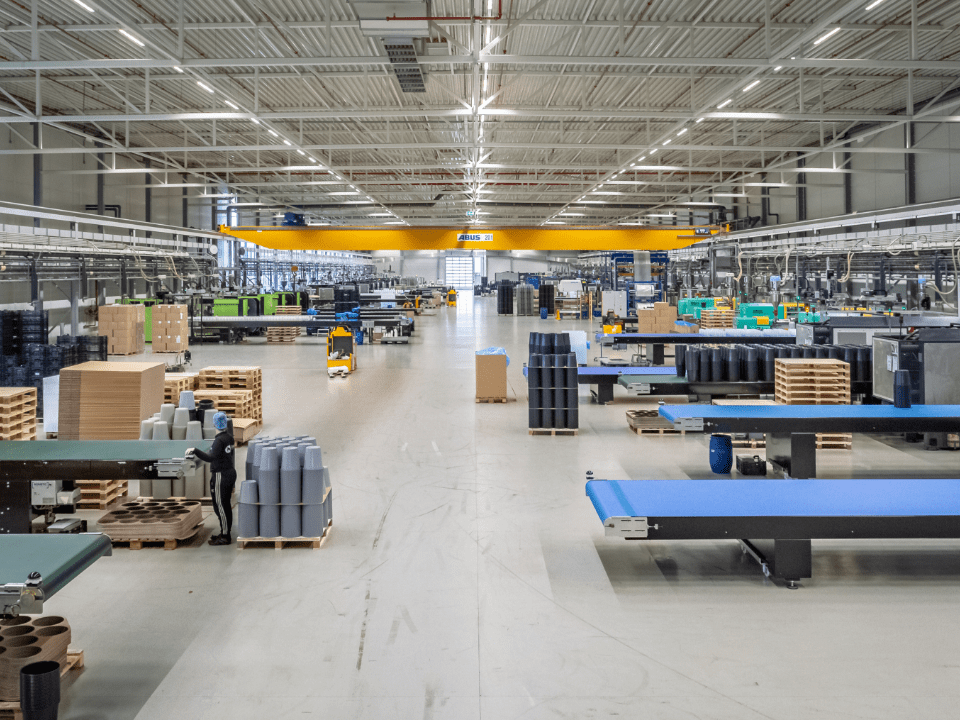
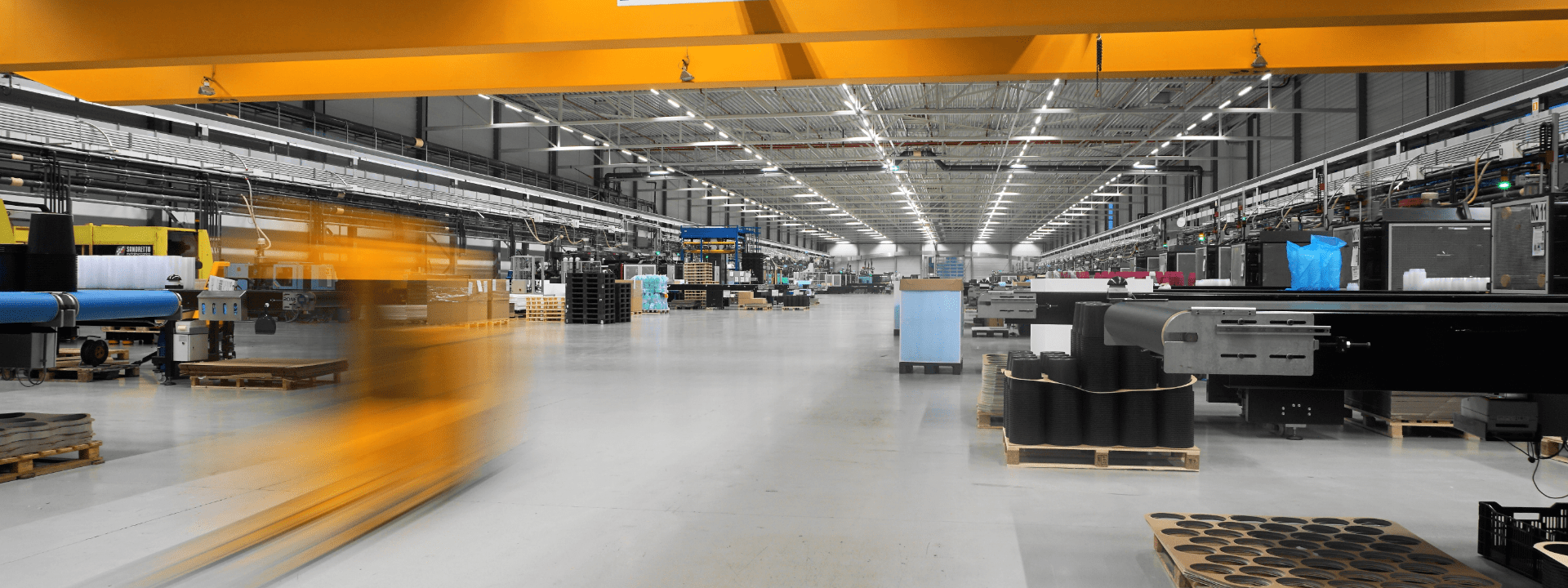
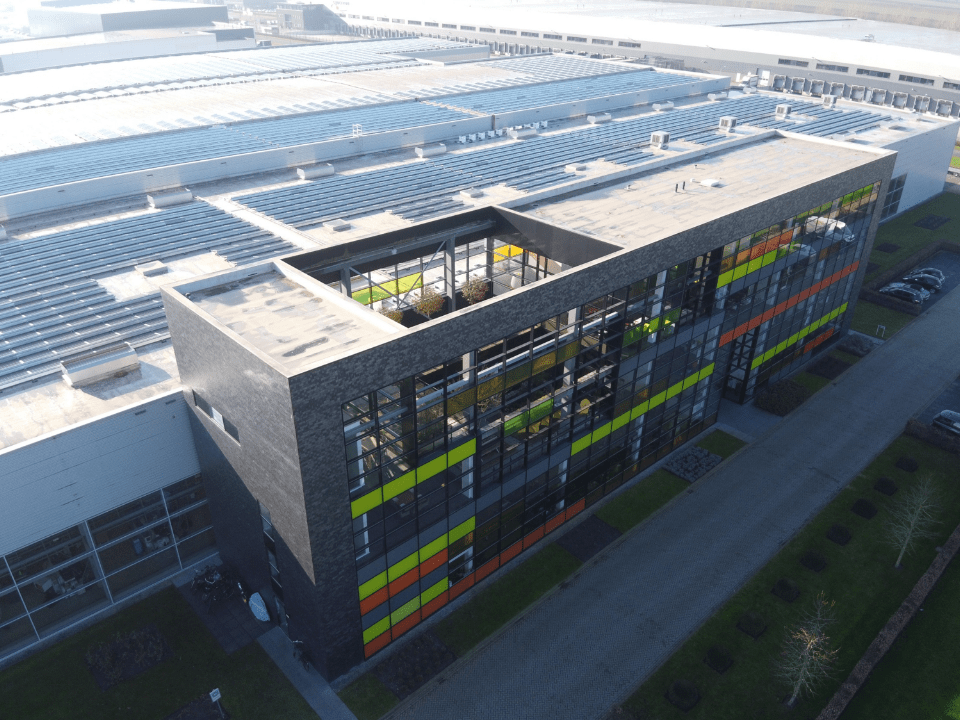
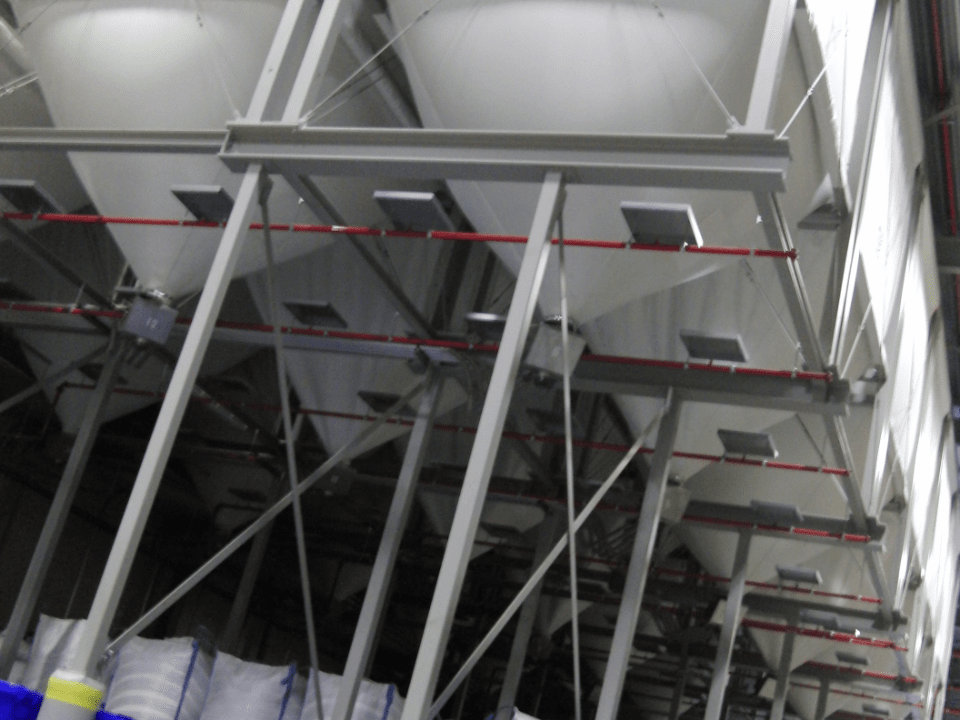
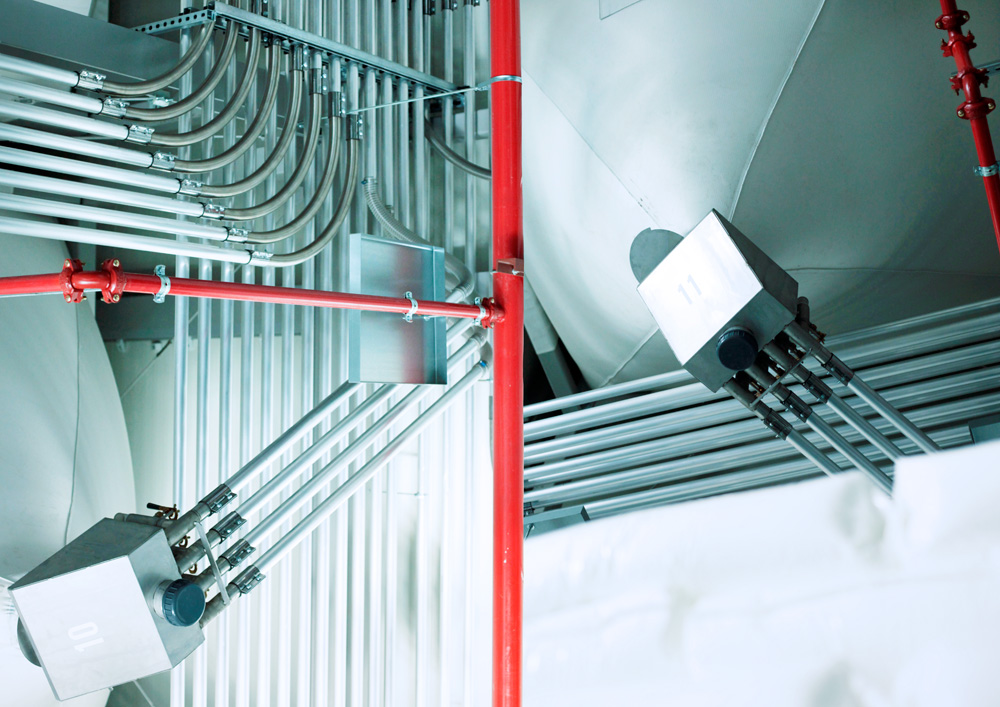
When we fitted out our premises on the Haven VII Business Park in Waalwijk, we applied the most low-energy solution to every energy-consuming operation. For instance, our cooling system consists of a combination of dry coolers and chillers with an exceptionally high C.O.P, the Coefficient of Performance. Our pipe system is over-dimensioned to minimise loss of pressure. At the same time, we use communicating vessels so that a vacuum is created in the return pipes. We use the residual heat to heat our offices and the warehouse.
The compressed air unit is frequency-regulated and is fitted with a heavy-duty loop to prevent pressure loss. The granulate silos are hung at the same height as the pipe transport system, so transporting the granulate uses less power.
We put a lot of thought into the power grid’s infrastructure. The power readings are set at 10KV. 10KV is transported on our own grounds. The transformers have been installed near the users and then 380V is transported along a voltage rail to reduce loss during transport to an absolute minimum. For years, whenever we invested in new injection-moulding machinery, the low-energy aspect has been a major, decisive factor.
Due to our investments, we have made real progress in cutting back on our energy usage. We believe that corporate sustainability is the future and that, in the end, it will produce a lower price for the product.

As well as all the measures we have introduced to our infrastructure to reduce our power usage to a minimum, we have also installed solar panels on our roof – these 6,690 panels create the largest glass-glass solar panel project in Europe so far. Its entire yield is used for our own operations. Annually, we generate 2,500,000 kWh of electricity which means that our manufacturing operations are fully CO2 neutral on sunny days. Let the sun shine in!

The reuse of raw materials is very important. Naber strives for a circular economy and uses recycled plastic whenever possible. At the moment 85% of our production is manufactured from recycled material. 40% of this is post-industrial and 60% is post-consumer.
Besides this, we put our focus on sustainability during the design process. We advise our clients to go for the most sustainable choice. This advice depends on the use of the product. For example:
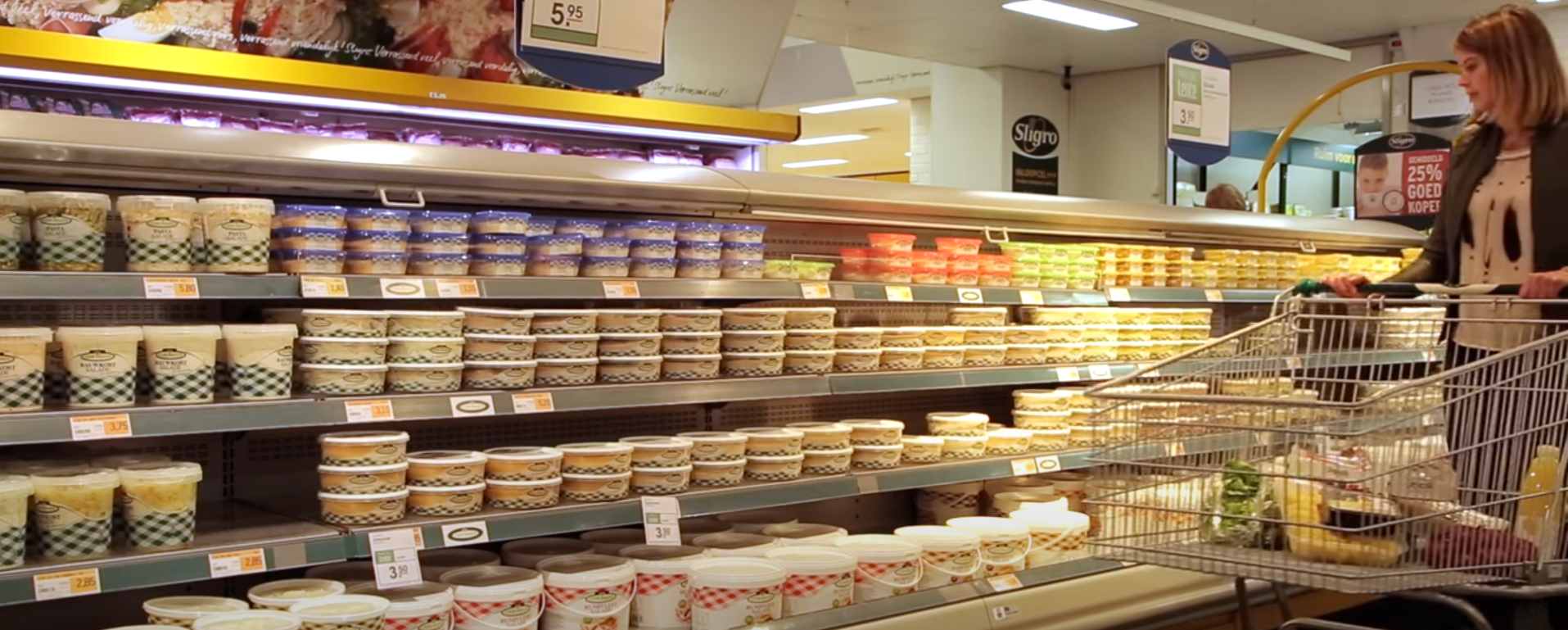
Plastic is a topic of discussion in our society. But is this justified?
Packaging has an impact on the environment: raw materials and energy are needed to make them and they give us waste. But packaging is often also very useful. Food has a longer shelf life because of this packaging and will be less damaged during transportation and storage. Because of this, we are throwing out less food and also need to buy less new food. The environmental impact of throwing out food is bigger than the impact of its packaging.
How does plastic packaging compare to alternative packaging, like paper, tin or glass in the area of sustainability?
Much research has been done on this topic. Plastic appears to be the best option for many applications when you look at its CO-2 footprint.
This is because plastic is a strong material with a low density. Because of this quality, we can manufacture plastic products very thin, which results in much lighter packaging then when made out of alternative raw materials. This means a low quantity of raw material per packaging and is also very efficient in the logistic area.
But what about the plastic soup?
Plastic in the environment is not okay, we can be brief about that. But can we blame the plastic? Or does the problem lie with people: the person who dumps it in nature? Plastic is a raw material. Like cardboard, tin or glass are also raw materials. Worldwide we need to be careful with these materials and collect them properly.
… working together to reach the next milestone?
With over 30 years of experience as a plastic injection-moulding company, we guarantee that when we work with you, we will find creative solutions. All you need to do is make enquiries.

BRC-iop norm
In order to meet the strict quality and hygiene demands of our clients, we chose to operate conforming to the BRC-iop standards. Standardised processes and procedures ensure that we can guarantee continuous quality and efficiency. Personal hygiene, Environment, Quality, Tracking & Tracing and a specific Risk Inventory & Evaluation are the key elements in this case.
We only have one earth at our disposal and we should be careful with it! Various innovative solutions were implemented in our company building, where the best energy-saving solutions are applied for each energy-consuming activity. This resulted in energy-savings of 47%, compared to conventional injection moulding.
ISCC PLUS certification
One of the latest developments in the field of sustainable production is the use of sustainable materials. There are many sectors in which the word sustainable is frequently used without this being demonstrable. Naber Plastics BV has taken this step by obtaining the ISCC PLUS certification. ISCC, which stands for International Sustainability and Carbon Certification, is an advanced program and the first globally recognized certification plan for biomass and bioenergy.
ISCC ensures that the process from monomer to end product runs correctly. Each system user is audited separately and very strict conditions are attached to the certification. Green must really be green and incorrect claims or inexplicable differences between imports and exports must be avoided. Naber Plastics BV has demonstrated that it meets these conditions and will make every effort to make this great circular development a success.
Over the years, we have already produced lots of patented product improvements. Those innovations were created by our own product development department, who can achieve great improvements for your packaging too, or shape your own specific wishes.